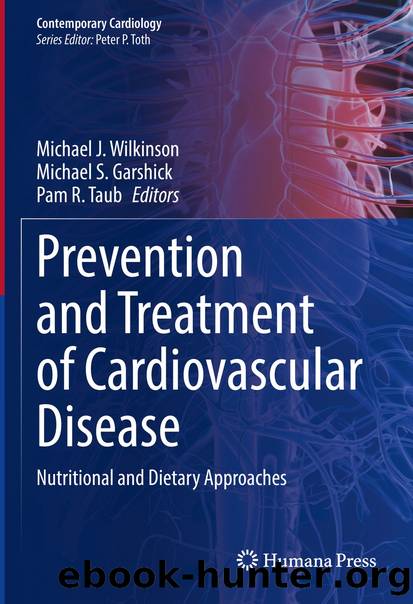Prevention and Treatment of Cardiovascular Disease by Unknown

Author:Unknown
Language: eng
Format: epub
ISBN: 9783030781774
Publisher: Springer International Publishing
Plant-Based Diets
Further along the spectrum of emphasizing a diet rich in whole, unprocessed foods is the plant-based diet plan described in Chap. 6. There are various flavors of plant-based diets, including vegetarianism, which omits all meat and fish intake, and veganism, which prohibits the ingestion of the above animal proteins as well as any animal-derived product, including dairy and eggs. Observational studies of cohorts which adhere to these eating habits for cultural and theistic reasons, including Seventh-Day Adventists and Taiwanese Buddhists, show a decreased prevalence of type 2 diabetes [22â24]. Additionally, these studies show that increasing BMI appears to be inversely correlated with level of adherence to a plant-based diet such that those with the lowest BMIs tended to consume the highest percentage of plant-based foods.
That is not to say that all plant-based diets are created equal or that all plant-based foods are beneficial for metabolic health. Post-hoc analysis of the Nursesâ Health Study, the Nursesâ Health Study 2, and the Health Professionals Follow-Up Study stratified those participants who were adherent to a plant-based diet into either a âhealthyâ plant-based diet group or an âunhealthyâ plant-based diet group [25]. Those in the healthy diet group tended more toward a diet that was rich in unprocessed foods, including whole grains, nuts, fruits, vegetables, and legumes. When adjusted for BMI, the healthy plant-based diet group had a decreased incidence of type 2 diabetes (HR 0.66, 95% CI 0.61â0.72, p trend <0.001) [26]. In contrast, consumption of an unhealthy plant-based diet was positively associated with type 2 diabetes (HR 1.16, 95% CI 1.08â1.25, p trend <0.001) [25]. Therefore, even within the dietary restrictions of a plant-based diet, it is still important to emphasize enriched consumption of whole, unprocessed foods to achieve optimal metabolic health. Finally, while processed foods and red meats are the worst offenders regarding risk of metabolic disease [26], we do not yet fully understand where highly processed plant-based proteins will fall on this spectrum. Therefore, the focus of dietary recommendations should still be grounded in promoting intake of unprocessed fruits, vegetables, and whole grains.
In addition to diabetes prevention, plant-based diets are also shown to be helpful in the treatment of type 2 diabetes and reducing cardiometabolic risk in these already high-risk patients. When compared to a typical diabetic diet as recommended by American Diabetes Association guidelines, those following a low-fat vegan diet had more significant reductions in their hemoglobin A1c, increased weight loss, and more improvement in their lipid control [27]. In both groups, hemoglobin A1c improvement was mediated primarily by weight loss, and participants ate on average 425 kcal less per day [28]. In the conventional diabetic diet group, this occurred via explicit CR, whereas in the vegan group, the caloric deficit was incidental to increased intake of lower calorie density foods.
Even in nondiabetic patients, eating a vegetarian diet is associated with decreased incidence and mortality from ischemic heart disease [29â31]. This holds true after adjustment for confounders such as age, total calorie intake, smoking, physical activity, alcohol use, lipids, and BMI [31].
Download
This site does not store any files on its server. We only index and link to content provided by other sites. Please contact the content providers to delete copyright contents if any and email us, we'll remove relevant links or contents immediately.
| Administration & Medicine Economics | Allied Health Professions |
| Basic Sciences | Dentistry |
| History | Medical Informatics |
| Medicine | Nursing |
| Pharmacology | Psychology |
| Research | Veterinary Medicine |
When Breath Becomes Air by Paul Kalanithi(7264)
Why We Sleep: Unlocking the Power of Sleep and Dreams by Matthew Walker(5642)
Paper Towns by Green John(4169)
The Immortal Life of Henrietta Lacks by Rebecca Skloot(3826)
The Sports Rules Book by Human Kinetics(3588)
Dynamic Alignment Through Imagery by Eric Franklin(3489)
ACSM's Complete Guide to Fitness & Health by ACSM(3469)
Kaplan MCAT Organic Chemistry Review: Created for MCAT 2015 (Kaplan Test Prep) by Kaplan(3423)
Introduction to Kinesiology by Shirl J. Hoffman(3301)
Livewired by David Eagleman(3122)
The River of Consciousness by Oliver Sacks(2992)
Alchemy and Alchemists by C. J. S. Thompson(2911)
The Death of the Heart by Elizabeth Bowen(2901)
Descartes' Error by Antonio Damasio(2731)
Bad Pharma by Ben Goldacre(2730)
Kaplan MCAT Behavioral Sciences Review: Created for MCAT 2015 (Kaplan Test Prep) by Kaplan(2492)
The Gene: An Intimate History by Siddhartha Mukherjee(2491)
The Fate of Rome: Climate, Disease, and the End of an Empire (The Princeton History of the Ancient World) by Kyle Harper(2436)
The Emperor of All Maladies: A Biography of Cancer by Siddhartha Mukherjee(2431)
